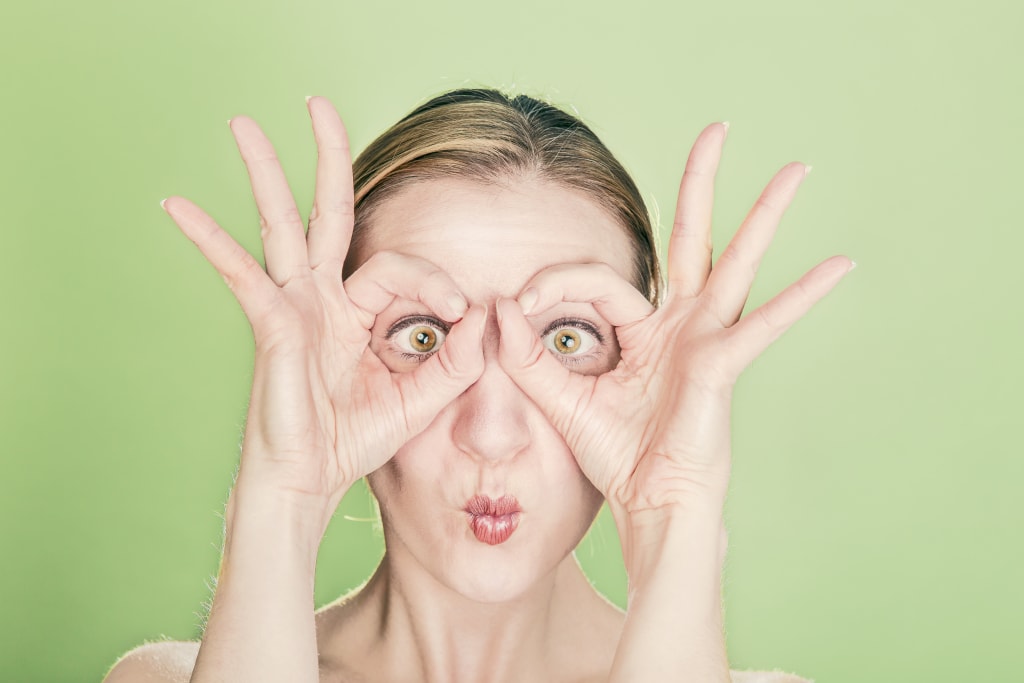When Is Makeup Sexist?
Makeup is a complicated issue. So, when is it sexist? The answer relies in a gradient.

I woke up this morning feeling today would be a makeup-free day. Days like these are not unusual for me, since I usually see makeup as an unnecessary task or a painfully boring chore with mediocre results. I am friends with people who do makeup professionally, they don’t share the same view of cosmetics as I do. This always felt natural to me; some people like makeup, some people do not. On one side of the spectrum, I recall remarks on how tired I must be, or how confident I must be, simply because I don’t wear makeup. On the other end, my friends who enjoy makeup can always recount a time when someone told them, “you don’t need to try so hard.” The distinction society makes between a “naked” face and a “done-up” face is, arguably, one of the most visible signs of sexism in our culture.
We can identify where on the gradient sexism of makeup falls by questioning our reasoning for wearing it. A study published in The Journal of Social Psychology seeks to find a connection between benevolent sexism and cosmetic use. Identified by the chivalrous nature it hides behind, an example of benevolently sexist makeup use would be someone wearing it because they felt it was “proper” and expected of them as women. Inside the study, participants were graded on their benevolent views, and their preference for makeup use: “…[Results] indicate the possibility that women who are high in benevolent sexism are more likely to use cosmetics in the pursuit of beauty.” (Forbes, et al) If the reason someone feels compelled to wear makeup is not because they enjoy it, but because they feel expected to, then it is hard to not see the sexism in it. This isn’t to say, the two reasons cannot coexist, hence the gradient of sexism. If you enjoy makeup, obviously, wear it. If you also feel it is expected of you, well, that’s unfortunate and something society needs to work on.
Women in politics especially face an inordinate amount of scrutiny for their looks versus their actual credential. In an article penned by Theodora Blanchfield for Campaigns & Elections, we see how the female candidate’s appearance is carefully picked apart and designed from the face first. Advice from the article tells the reader, “[a] woman should wear makeup that brings out her eyes and her face. She should understand how to line her eye so that it's noticeable and wear lipstick that is not overpowering.” (Blanchfield) This proves an unfair scale on which women are judged. In the article titled, “Let Sen. Hillary wash and wear and legislate,” in the Philadelphia Inquirer, we come to a very recognizable example of this sexist appearance standard. Hillary Clinton is a busy person, and I don’t presume to know her personal opinions on wearing makeup, but I think it’s safe to say that some days she might be a bit too busy to put on a face of “natural” makeup. Natural, because it still looks like you didn’t try too hard but you still definitely care. This an article criticizing the coverage of Hillary Rodham Clinton having the gall to appear at her job, in the senate, makeup-free, surrounded by dozens of makeup-free men.
When Sarah Palin ran for the Vice Presidency in 2008, many viewed her candidacy as glass ceiling breaking, because a woman has yet to hold office at the White House. In an article by Culture of Beauty writer Natasha Walter, she pointed out the focus people paid on Palin’s aesthetics versus her credentials. Palin had a lot to be analyzed, being a prominent Republican politician, who was very proud of not being politically correct. Despite legitimate qualms with her campaign, her physical appearance and what she wore was almost always was the first to be commented on. According to Walter, at the time of the campaign, “[m]anufacturers released a 'naughty schoolgirl' Sarah Palin doll, with a red bra showing through a school uniform blouse, and even a blow-up sex doll.” (Walter) Female politicians do not get a choice of whether to wear makeup or not, their choice is what do they want to be the biggest headline? Their aesthetics or their policy? In this limiting circumstance, the inherent sexism of the standards we, as a society, place on women about how they present themselves, are blaringly obvious.
This is not true of all cosmetic and makeup use, though, as we see in a work published in the International Journal of Cosmetic Science by Y. Sagehashi, which discusses the importance of “therapy makeup.” The article emphasizes makeup as a way for patients (of no specified gender) with skin disorders to regain confidence. This an extreme case, but if the wearer enjoys makeup, the act of applying it, the final result, is it not an act of self-expression? I argue that makeup lives on a gradient of sexism. It can be sexist when the wearer feels pressured to wear it, or not wear it. It can also be extremely feminist in that if it women are taking control of the narrative. A made-up face is not someone trying too hard, it’s someone who enjoys makeup. A naked face is not a reflection of the person’s laziness or lack of caring, it is simply a person who does not enjoy makeup. Decisions that hold that much power of how you present yourself in society, however, cannot be always that cut and dry. Thus, the gradient: and an example would be me. Some days, I do feel like wearing makeup, some days I am completely makeup-free, and others, I recognize the benefits of makeup and put it on anyways even if I do not really want to.
In conclusion, the way we, as society, answer the question, “when is makeup sexist?” is by first asking it of ourselves. Do we view makeup as an essential? If so, are you a female-identifying person making that assertion, or a man stating a preference? Is it an essential in that it is a chore we must put ourselves through? Or is it an essential merely because we enjoy it? Changing our own attitudes towards cosmetics is the only way to make the choice just that, purely a choice. The examples of how female politicians and benevolent sexism are intwined in our society prove otherwise, though. Introspection, spending time focusing on yourself, is really the only way to figure out if you have a healthy view of makeup.
Works Cited:
Blanchfield, Theodora A. "Superficial Significance." Campaigns & Elections Vol.28, No.1, Jan, 2007, pp. 34-37, SIRS Issues Researcher,https://sks-sirs-com.delgado.idm.oclc.org. Accessed 10 Apr. 2017.
Bradley-Geist, Jill, et al. "The Collateral Damage of Ambient Sexism: Observing Sexism Impacts Bystander Self-Esteem and Career Aspirations." Sex Roles, vol. 73, no. 1-2, July 2015, pp. 29-42. EBSCOhost, doi:10.1007/s11199-015-0512-y. Accessed 10 Apr. 2017.
Forbes, Gordon B., et al. "Benevolent Sexism and Cosmetic Use: A Replication with Three College Samples and One Adult Sample." Journal of Social Psychology, vol. 146, no. 5, Oct. 2006, pp. 635-640. EBSCOhost, delgado.idm.oclc.org/login?url=http://search.ebscohost.com/login.aspx?direct=true&db=a9h&AN=22544674&site=ehost-live. Accessed 10 Apr. 2017.
Sagehashi, Y., et al. "Therapy Makeup Improves Quality of Life of Patients with Skin Diseases – Covering Foundations Created by Integration of Medical and Beauty Care for Severe Skin Color Problems." International Journal of Cosmetic Science, vol. 31, no. 2, Apr. 2009, pp. 153-154. EBSCOhost, doi:10.1111/j.1468-2494.2008.00451_2.x Accessed 10 Apr. 2017.
Traister, Rebecca. "The Prominence of Women Candidates Has Permanently Altered American Politics and Feminism." Feminism, edited by Nancy Dziedzic, Greenhaven Press, 2012. Opposing Viewpoints. Opposing Viewpoints in Context, Accessed 10 Apr. 2017. Originally published as "Rebecca Traister Talks About 'Big Girls Don't Cry: The Election That Changed Everything for American Women,'," Christian Science Monitor, 28 Oct. 2010. Accessed 10 Apr. 2017.
Walter, Natasha. "Women Are Judged on Their Appearance Rather than on Their Competence." The Culture of Beauty, edited by Louise I. Gerdes, Greenhaven Press, 2013. Opposing Viewpoints. Opposing Viewpoints in Context, delgado.idm.oclc.org/login?url=http://link.galegroup.com/apps/doc/EJ3010659235/OVIC?u=lln_adcc&xid=2abb6938. Accessed 10 Apr. 2017.
Weiner, Jennifer. "Let Sen. Hillary wash and wear and legislate." Philadelphia Inquirer [Philadelphia, PA], 9 Feb. 2001. Opposing Viewpoints in Context, delgado.idm.oclc.org/login?url=http://link.galegroup.com/apps/doc/A121254400/OVIC?u=lln_adcc&xid=25221a06. Accessed 1 May 2017.
About the Creator
Adriana Jurado
College student with a passion for disabled representation and an appreciation for unholy amounts of fried things.






Comments
There are no comments for this story
Be the first to respond and start the conversation.